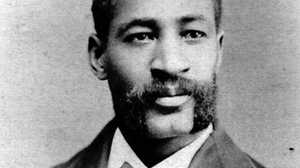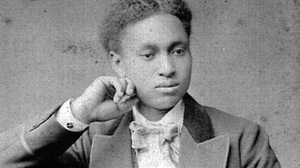Maggie Porter, Soprano

Although she sometimes forgot her lines, Maggie Porter's outstanding soprano voice made her a central member of the Jubilee Singers. Porter did not always get along well with the other singers, but (except for a three-month banishment in 1876), still remained with the group for all three tours of the U.S. and Europe. She went on to establish herself as a musician in her own right and even to organize her own troupe of "Fisk Jubilee Singers" in the 1880s.
Born a slave in 1853, Porter sat outside Nashville's churches as a little girl in order to hear the music being sung inside. She started attending school when she was twelve and was admitted to Fisk when it opened in 1866. Two years later Porter became one of the Normal Department's first graduates, and she immediately took a teaching job in Bellevue, seventeen miles outside of Nashville. Though her first school was burnt down by the Ku Klux Klan during Christmas break, Porter went on to teach at two other Nashville-area schools for freed slaves.
In the winter of 1870, George White asked Porter to star in Handel's "Cantata of Esther," which would be performed around Nashville the following spring. Porter, who had sung under White when she was a student at Fisk, agreed to study for the part on her own, since she wasn't living in Nashville and was still employed as a teacher. Receiving great acclaim for her role as Queen Esther, the eighteen-year-old Porter decided to join White's choir for their upcoming tour.
Porter traveled with the singers for seven years. At the end of their last tour, she elected to remain in Germany of the their last tour. She eventually returned to Nashville, however, and joined Frederick Loudin’s reorganized company of Fisk Jubilee Singers, which contained members of the original choir but was not associated with Fisk. In 1884 Porter and her new husband, tenor Daniel Cole, formed their own company, inviting former Jubilee Singers Georgia Gordon, Jennie Jackson and Minnie Tate to join them. This group also called itself the Fisk Jubilee Singers and toured the U.S., Canada and Europe during the 1880s and 90s.
Porter eventually settled in Detroit, where her reputation and continued involvement in music quickly established her as a leader in the local African American arts community there. While organizing concerts and continuing to perform themselves, Porter and Cole raised three children, about whom little is known. One son later died as a soldier for the French government; the other died while a student at the University of Michigan. Their daughter, Imogene Cole Reid, was an invalid who ended up back in Detroit with her aging mother after becoming unable to care for herself.
Porter’s resentment of her treatment as a Jubilee Singer -- the relentless touring, the lack of rest, and the managers’ schemes to prevent her from striking out on her own as a solo performer -- stayed with her for many years. These memories, and her feeling that the South remained an unwelcome place for African Americans, prevented her from returning to Fisk until 1931. (She returned then only on the condition that a driver pick her up in Detroit, because she refused to ride segregated trains and buses.) Throughout her life Porter was revered by students at the school for her success as a singer and eventually for being the only surviving member of the original Jubilee Singers.
As an elderly woman, Porter moved into a Phyllis Wheatley home in Detroit. A niece of Frederick Loudin’s was on the board there and took special care of her until her death in 1942.







